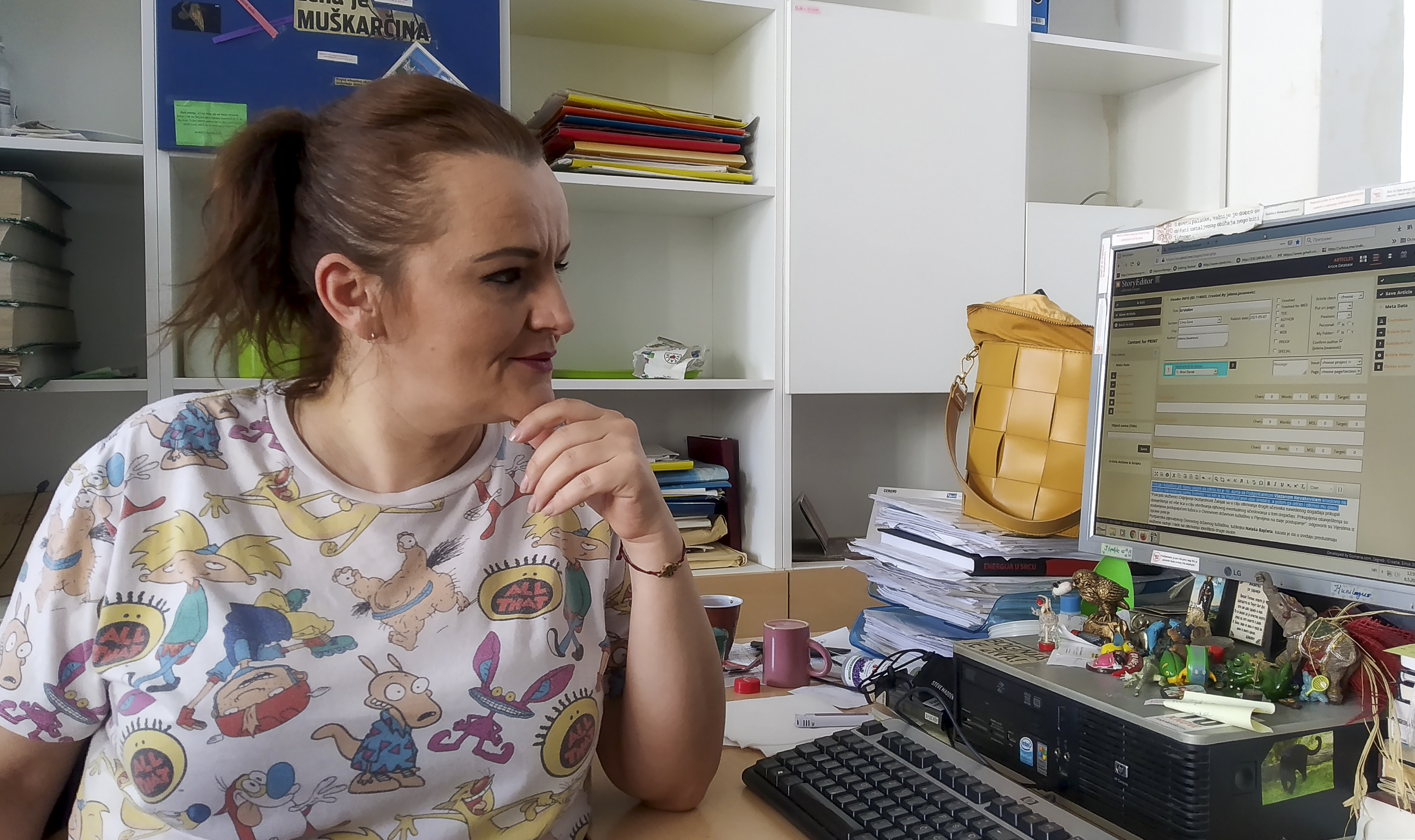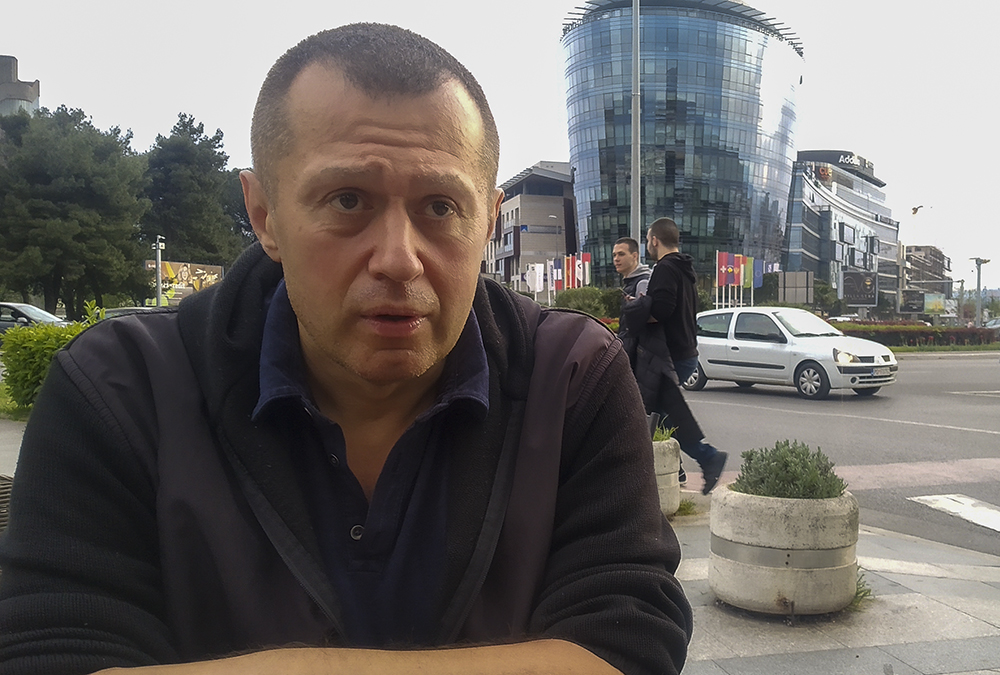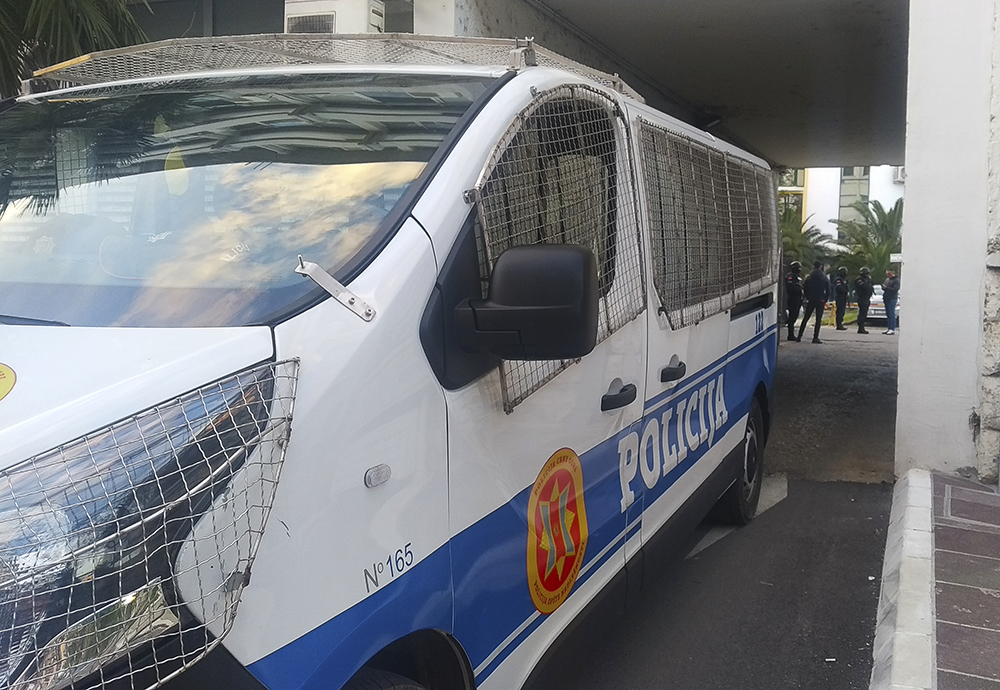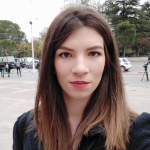Montenegrin journalists didn’t have much reason to celebrate this year’s World Press Freedom Day, on May 3, nor the ones that preceded it. New attacks produced additional pressure over the last two months. During the second half of March — a period of less than 15 days — three attacks on journalists were reported.
However, the previous year was also a tough one for those working in the media, while the situation hasn’t been any different in the past decade, an era when they worked in an atmosphere of insecurity, danger, and everyday risk, albeit not only alongside threats that are naturally part of the job for “the defenders of democracy.”
“Based on domestic and international reports, while monitoring the state of affairs on the ground and events in this area, one gets the impression that the status of journalists (in Montenegro) still doesn’t reflect the importance of the role they play in society,” ombudsperson Siniša Bjeković told K2.0 in an email.
According to data provided by the ombudsperson, 2020 wasn’t a year of sweeping efforts to advance media freedoms. A long list of violations against those liberties during the last decade includes unsolved murders and attempted murder cases and attacks; the unregulated employment status of some employees; a disquieting financial situation in most local public broadcasters; vocal disputes within the media community and the struggle against fake news. Plus arrests, threats, and insults directed at journalists, all for doing their job.
The pandemic appeared during this already troubling situation, bringing about further restrictions and a denial of freedom to everyone. Nonetheless, this year, the public was exposed to information about illegal eavesdropping, and 18 events were reported as harmful to journalists and media.
Beatings and abuse on the job
Recent attacks resemble a culmination of various tensions that have been simmering for a while in Montenegro. The first worrying events occurred in mid-March, when on local elections day in Nikšić, Jelena Jovanović of the Independent daily newspaper “Vijesti” was injured.
While reporting from a mass gathering in front of the headquarters of the “For the Future of Nikšić” — a coalition of local political parties — after the election results were declared, Jelena was hit in the head with a windshield wiper. The public seemed more concerned as to who the attacker was targeting, rather than who the perpetrator was. There were no discussions concerning the unsafe environment for journalists working in the field.

The attack on Jelena Jovanović was one of three that took place this year. Photo: Jelena Kontić.
In a conversation with K2.0, Jelena says that no matter whether the rioter hit her intentionally or not, “this is something that will ultimately be established in court; I felt completely unprotected that night, although there were at least 20 police officers there whose legal duty it is to protect citizens.”
“They didn’t react, the attacker wasn’t arrested immediately after he hit me on the head, nor did the police prevent him from committing the act, considering he was behaving illegally by attacking them as well,” Jovanović recalls, emphasizing how this helps build a favorable climate for attacks on journalists.
And indeed, just seven days after Jelena’s incident, Sead Sadiković was targeted, and 14 days later, their colleague Esad Kočan was attacked.
“None of this is new to us but it's really worrying.”
Jelena Jovanović, journalist
Sadiković, a well-known anchorman and journalist, and Kočan, editor-in-chief and longtime journalist for the weekly magazine “Monitor” — a magazine recognized by some as a symbol of resistance in Montenegro — were attacked in their home cities of Bijelo Polje and Podgorica respectively. According to witnesses and Sadiković himself, he was attacked by a group of at least four young men from a so-called patriotic motorcade, suffering physical injuries. The attack was stopped by a group of citizens who were nearby.
A video recording of the attack circulating through social media was the subject of abuse, intimidation, and public deception, involving the police. The police, according to the Interior Ministry’s state secretary Zoran Miljanić, believe it was edited to hide the perpetrator, and are working to establish the circumstances of how it ended up public.
In an email reply to K2.0, Miljanić says that the part of the recording that could establish who was responsible for the attack on Sadiković can be found in 10 deleted seconds of the recording from one of several surveillance cameras nearby.
Kočan’s case is somewhat different. Namely, in front of the building he lives in, he was approached by a stranger who threatened and insulted him. At one point, this man physically charged at him. It turned out it was an individual with previous convictions.
“None of this is new to us but it’s really worrying,” Jovanović stresses. Together with the rest of Montenegro’s public, she is waiting to hear results from investigations on attacks on journalists. However, they are missing at the moment.
In Jelena’s case, the Nikšić police filed a report against one person suspected of committing “the criminal offense of violent behavior to the detriment of a journalist.”
In Esad Kočan’s case, the trial began on May 19. The suspected attacker is still in detention, accused of jeopardizing safety, and may be sentenced to up to one year in prison.
Additionally, the government recently appointed the Commission for Investigating Attacks on Journalists, which will, as they explain, have “broad powers and the possibility to be assisted by a foreign expert.” One Member of the Commission’s Steering Committee is Sead Sadiković, and the president is Mihailo Jovović, also a victim of an attack.
Tepid reactions of authorities
The most recent case occurred in mid-April when, while working, the public broadcaster Radio Television of Montenegro’s journalist, Nebojša Šofranac, was abused. He was reporting from the welcoming ceremony arranged for the Montenegrin boxing representative, Petar Liješević, who won the silver medal at the World Youth Championship, when some citizens gathered threw insults at him, while threatening shouts could also be heard.
Šofranac says he perceives the whole event “a bit broader.”

Journalist Nebojša Šofranac says he would like all of the attention to be focused on the news report and not the attack against him. Photo: Jelena Kontić.
“I must say that, from the very beginning, I don’t view this as an event of incredible proportions and a big scandal,” Šofranac told K2.0, insisting that everything ended on the night it happened and that he feels sad because it was not left at that.
“If it was like I wanted it to be, people would talk about the media report I made, where I emphasized completely different things: like success in sports. The only thing I want from this situation is for it to end,” Šofranac concludes.
However, what is particularly worrying about his case is the fact that the main abuser was Vladimir Vuković, a consultant in the Ministry of Education, Science, Culture, and Sports.
“Since 2010, Montenegro witnessed 55 attacks. Not one of the more serious previous cases has been solved.”
Damir Nikočević, Center for Civic Education.
In the available video, one can see and hear how Vuković is abusing a journalist. Notwithstanding, the relevant ministry where he works has complimented Vuković’s attempt to help Šofranac “secure an interview with the world’s silver medalist, Liješević.” They added that he was present at the celebration as a private person and that they won’t sanction his behavior since they don’t have any mechanisms for doing so.
Still, condemnations due to the recent attack arrive from different places, with the NGO sector being the most vocal. The Center for Civic Education’s developmental coordinator Damir Nikočević reminds us that, apart from the condemnations, most attacks against journalists and media property in Montenegro have never received a satisfactory epilogue.
“Since 2010, Montenegro has witnessed 55 attacks. Not one of the more serious cases has been solved, including the murder of co-owner, director and editor-in-chief of ‘Dan’ daily, Duško Jovanović; the attempted murder of ‘Vijesti’ journalist and weekly ‘Monitor,’ journalist, Tufik Softić; as well as that of ‘Vijesti,’ journalist, Olivera Lakić,” Nikočevič reminds us. Nevertheless, he mentions that more actions are usually noticeable ahead of the release of the European Commission’s progress reports for Montenegro.

Damir Nikočević from the Center for Civic Education says that in the last 20 years Montenegro witnessed 55 attacks on journalists and media. Photo: Courtesy of the Center for Civic Education MNE.
“All this suggests that relevant institutions aren’t working either responsibly or professionally, mostly due to political limitations,” Nikočević concludes, adding that ommissions in official investigations, such as the one related to the murder of Duško Jovanović, were established by members of the former government.
“It’s necessary to seriously and significantly expand the efforts and intensify the investigations of cases of attacks on journalists and media property, accompanied by solid and measurable results entailing the identity of the originators who ordered them,” Nikočević is resolute in his stance.
Solid steps
Jelena Popović, journalist and activist from the Montenegrin Society of Professional Journalists also believes that it isn’t sufficient to just advocate for the freedom of media and safety of journalists but that “concrete, clear, and decisive actions are needed to genuinely advance the state of this sector.”
“By this, we primarily mean those authorities who so far haven’t shown their proactivity and measurable results but on the contrary — cases are dragged on in the prosecution for years, waiting to be resolved,” Popović warns in a conversation with K2.0. She adds that it isn’t possible to talk about securing the conditions for unobstructed work of those employed in the media “until the former cases of attacks against them are resolved, and the perpetrators brought to justice.”
State prosecutor and spokesperson at the Basic State Prosecution in Podgorica, Vukas Radonjić, says that cases of endangering media freedoms are held “under particular scrutiny.”
The newly elected government noticed holes in previous processes. In an email correspondence, the Interior Ministry mentions that investigations and court proceedings in cases of attacks on journalists “must be a priority from now on.” People from this ministry say that they can’t be satisfied with the sentences against perpetrators so far and that the perpetrators weren’t punished. However, they believe they have been “up to the task” in investigating the recent attacks on Sadiković and Kočan.
The police handed over the results of the investigation to the prosecutor’s office for further action. State prosecutor and spokesperson at the Basic State Prosecution in Podgorica, Vukas Radonjić, says that cases of endangering media freedoms are held “under particular scrutiny.” The same goes for attacks on journalists, discrimination cases, and endangering or violating fundamental human rights and liberties. They claim that the cooperation with the police is “at its best.”
However, journalist Jelena Jovanović says that she felt a police reaction was lacking on the night she was injured and that no one from the said Nikšić-based prosecution office contacted her.
“The only explanation for the lack of reactions from the Police Department’s officials, who were on the spot of the event, is that they were ordered not to respond,” she says. She also believes that hers isn’t the only case of an attack where “the truth was carefully concealed.” This hiding of the truth, she thinks, indirectly justifies and supports future attacks, intimidation, and threats.
“Resolving attacks on journalists and media property is a disgrace to the Montenegrin investigative authorities and that of the judiciary,” Jovanović warns.
Official status, a double-edged sword
In order to try to provide better protection, recent consultations have been initiated once again about assigning an official status to journalists. This suggestion dates back to 2010, when it was recommended by the Action for Human Rights NGO. For years, officials have claimed that there is no legal basis for assigning this kind of status to journalists but now the initiative is supported by the Montenegrin Society of Professional Journalists, with certain amendments.
“We started off from the more realistic variant that already exists in criminal law in the region because we know that somebody else’s practice is the best starting point,” says Jelena Popović, the Society’s representative. She describes how the new suggestions entail intensifying sentences for attacks on media workers.
“As for the region’s countries, a higher level of protection by law is enjoyed by journalists in Croatia and Serbia. Serbia doesn’t explicitly mention journalists but specifies professions that are being done for the sake of the public interest and that are exposed to an elevated risk of attacks. This formulation would be acceptable for us in Montenegro as well,” Popović clarifies, adding that the Society is expecting more concrete solutions “as soon as possible.”
The Society’s representatives maintain that in order to equate journalists with officials, it is necessary to consider in detail what is meant by that; meaning, what exactly would be the duties and obligations of journalists in this case, and what are the benefits of obtaining such a status.

Will the police react differently to attacks on journalists if they have the same status as officials? This is the question that many are asking these days in Montenegro. Photo: Jelena Kontić.
Journalist Jelena Jovanović says that nevertheless she still doesn’t understand the whole ordeal with assigning official status to journalists.
“Being official doesn’t in and of itself mean that we will be better protected. I’m afraid that this status would bring about great limitations to our work in the current Montenegrin conditions. Those who are used to silencing everybody around themselves would definitely know how to abuse it,” she says, claiming that the judiciary could alleviate the situation if they only treated everyone equally and sanctioned people per the law.
Questionable solidarity among journalists, controversial public attitudes
As for responsibility, all of the people who spoke to K2.0 agree that political tensions that have disrupted the public discourse in Montenegro for months have partially created an unfavorable environment for journalistic work.
“All the more significant social and political events are definitely impacting citizens and the general atmosphere in society. Unfortunately, the period of transitions and turbulent political enthusiasm is still present,” representatives of the Ombudsperson Office agree.
Journalist Jelena Jovanović says that nevertheless she still doesn’t understand the whole ordeal with assigning official status to journalists.
“Being official doesn’t in and of itself mean that we will be better protected. I’m afraid that this status would bring about great limitations to our work in the current Montenegrin conditions. Those who are used to silencing everybody around themselves would definitely know how to abuse it,” she says, claiming that the judiciary could alleviate the situation if they only treated everyone equally and sanctioned people per the law.
Questionable solidarity among journalists, controversial public attitudes
As for responsibility, all of the people who spoke to K2.0 agree that political tensions that have disrupted the public discourse in Montenegro for months have partially created an unfavorable environment for journalistic work.
“All the more significant social and political events are definitely impacting citizens and the general atmosphere in society. Unfortunately, the period of transitions and turbulent political enthusiasm is still present,” representatives of the Ombudsperson Office agree.
The Society's representatives stress that they are distraught by the lack of solidarity among journalists.
Nevertheless, Jelena Jovanović regards the causes of the frequent attacks as a constituent part of the perennial negative campaign against journalists but sees it also as a result of impunity for past attacks.
The Society’s representatives stress that they are distraught by the lack of solidarity among journalists, which Jelena Jovanović has also fallen prey to.
“People who matter to me called to ask about my well-being, offered help, and were outraged. My family requested that I finally stop exposing myself at the frontlines at all events, and the rest — the minister who is in charge of the media, the NGO sector, colleagues, political parties — all declared their stance by remaining silent,” she recalled.
Unlike domestic institutions and media, and apart from the Media Union of Montenegro, the attack on Jelena Jovanović inspired reactions in foreign journalist associations. “The journalists in Montenegro don’t see their colleagues working in other media as healthy competition but as enemies, which is unheard of,” Jovanović tells us with regret.
Nevertheless, the attacks on Kočan and Sadiković still forced colleagues to go out to protest in Bijelo Polje under the slogan “We’re all Nero and Edo ( Kočan and Sadiković’s nicknames).” However, all the stories of attacks quickly fall silent.
The Society of Journalists is resolute in requesting that the authorities show “proactivity, timeliness, and determination in finding and sanctioning perpetrators of attacks on journalists.” Representatives from the ombudsperson’s sector believe that the only way to hinder future attacks is for the authorities to reexamine the situation as soon as possible, to urgently solve problems.
“All attacks against journalists, the media, and their property must be effectively and fully investigated and prosecuted since that’s the only way to deal firmly with the pressure against free journalism in the long run,” Siniša Bjeković concludes, remarking that media are the cornerstone of any free society and that they have no alternatives.
Feature image: Jelena Kontić.





